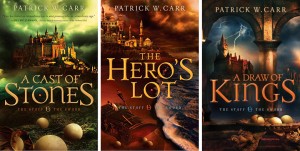Review: The Staff & The Sword trilogy by Patrick W. Carr
This trilogy started out with one of the best books I have read for many years. A Cast of Stones brought me into the life of a brutalized orphan, Errol, in a way which I have not enjoyed in a long time. A lot of the standards are there: an evil corrupt church, a kingdom falling apart and desperately compromised (as the death of the king approaches), wise counsel from good men, discoveries of ancient truths, and truly heroic warriors—both male and female.
This excellent trilogy could have been so much more
I bought The Hero’s Lot, but I saved it in anticipation of the third book. When Bethany gave me a review copy of A Draw of Kings, I was truly excited. As someone who has read 10,000 books or much more in my lifetime, this is really something. So, was my anticipation rewarded? Not really.
Did the story proceed as expected, with many turns, twists, and disasters? Yes, it did. In almost all ways the story did what I hoped and more. Evil was evil. Good was good. The righteous triumphed? Well, were there any righteous? UMMM, I’m confused. And that was the ending of the book for me.
This morning as I sit here to write the review, I skimmed and reread the ending of the story. It really did end the way I hoped, but it was so obscured by subtlety and confusion that I missed it the first time through. I suppose that’s a good thing, but it wasn’t a pleasant or fulfilling end to a story I originally thought might end up in the ranks of works like Lord of the Rings. With the final readthrough this morning, I am now comforted. But I spent two days disappointed and almost depressed by the ending. Most of my friends (in the book) were killed—I think. For many of them, I simply don’t know. Yes, killing a few of the good guys can be done well. But in many ways, the ending seemed like carnage without hope.
There was even a satisfying romance. However, it is also obscured by the seeming inability of all the lead characters to mature. They are presented as unable to get past old hurts to grow spiritually. They are barely able to get beyond the past and their fears. Only in the epilogue is spiritual maturity shown—and we are only given tantalizing hints.
The problem is the spiritual reality of the book
One of the things I was so excited about as I read A Cast of Stones was the true possibility of a great fantasy touching truth compellingly. It looked like the book would actually be edifying—a joy to read because it shared truth. In so many ways this book did that, but it seemingly lost its way about halfway through The Hero’s Lot. As the spiritual reality of this book is revealed, its lacks are also exposed. Simple things, like an afterlife, are barely mentioned. One of my friends (in the book) hints that there’s more after this life as he dies, but it is not any part of the book in a real way.
One of my real complaints about Christian fantasy is that, at best, they show forth an Old Testament spiritual truth. God is distant and unknown. His ways are mysterious and man must simply deal with what God does. He’s an external agent acting whimsically. God comes upon certain people in a prophetic way. But a general personal relationship with God, for people at large, is unknown and usually presented as impossible. The Staff & The Sword almost got beyond that. The first book hinted at a savior/redeemer. He is named, but there is no contact with him. No one knows Him. He’s out of the distant past. He’s never a factor in the story.
In fact, decisions are made by the leadership through divination. This method of prognostication is presented as absolute truth—as the way God makes his dictates known to his people. But then in this story, God really doesn’t have any people. There are believing kingdoms in thrall to ancient tradition and non-believing kingdoms in thrall to demon-possessed leadership. This is very well done through out TS&TS, but it is not Christian by any stretch of the imagination.
But I hadn’t given up hope. There is actually a strong illusion to the Holy Spirit in this world Carr created. However, He’s not knowable either—even though the characters in the book say He is. The spirit in this trilogy is not the Paraclete, the one called alongside to help and comfort. He’s still distant and unknowable in any real way. No one has a relationship with either the savior or the spirit. His main power in the first two books is that he can thwart divination. The heroes and heroines all come to believe in Him (the spirit), but he remains an unknown, all-powerful force acting upon his whim. It’s not nearly as bad as the force in Star Wars, but it is nothing like the truth of the Holy Spirit either.
Do I recommend this book and this trilogy? Yes.
I repeat, yes; but it could have been so much more. It was ultimately a sad read. I can barely give it four stars.



Pingback:The Makilien Trilogy is that rare fantasy which is inspiring & edifying » Reality Calling